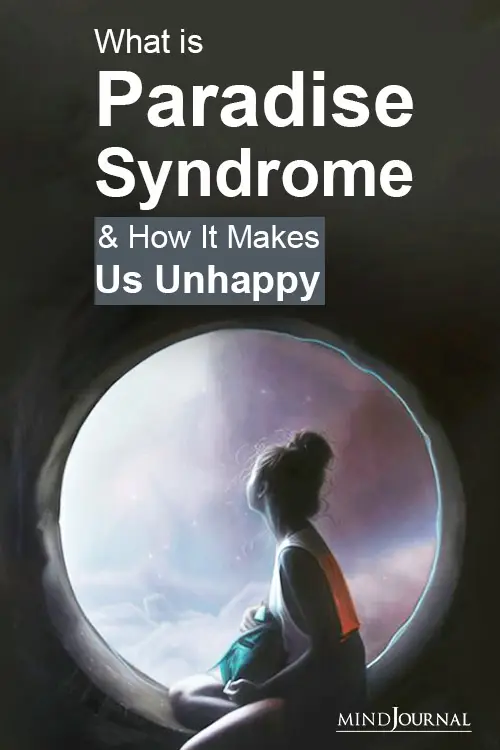Do you have a successful career, a loving partner and your dream life, yet you feel unhappy and empty? Then you might be suffering from paradise syndrome.
What is paradise syndrome?
It is a condition that makes an individual feel unhappy and dissatisfied with themselves even though they have achieved everything they have ever dreamed or hoped for.
However, it is not yet medically recognized by psychologists and doctors as a mental condition. It has been observed that paradise syndrome mostly occurs in people who are highly successful and wealthy. When a successful person feels like they don’t have anything else in life to pursue and achieve, no new challenges to overcome, then tend to feel mental and emotional dissatisfaction.
This may be a result of the narcissistic age we live in currently, believes psychology lecturer Dr. Yong Wah Goh at the University of Southern Queensland. Goh explains “People who have unrealistic high expectations will never be satisfied, their goal post is always changing.
The way the world is now it seems to support the development of the more narcissistic attitude.” As we are constantly setting a new benchmark for ourselves, no matter how much we achieve, it is never enough. We are excessively preoccupied with ourselves, our goals and our lives. We can go to great lengths to satisfy ourselves first and foremost. Dr. Goh adds “It’s me, me, me all the time. They’ll do everything to satisfy themselves first.”
Read also: The Epicurean Philosophy for Happiness: How To Be Happy & Seek Pleasure
Dr. Yong Wah Goh says “Everyone around them they see as people who will bolster themselves, they don’t like to be around people who make them feel bad. The paradise syndrome is a consequence of having a very high expectation about yourself and not being able to let your mind relax.” According to the Daily Telegraph, Madonna and Victoria Beckham are considered to be prime examples of individuals suffering from paradise syndrome.
Understanding paradise syndrome
Most of us tend to have a vision about how our life is and how it should be. However, when these two views are different and there is a discrepancy, we feel an urgent need to close the gap and experience satisfaction. This is a type of problem formation as explained in a 1974 study by Watzlawick et al. However, as our mind is geared towards looking for meaning and purpose in everything we do, we can often become disheartened by the realization that there is no purpose to pursue any longer.
Hence, we can experience paradise syndrome paradise syndrome when we are unable to define ourselves and fail to understand who we are or what we represent. This is especially common in individuals who define their identities by a specific role, like entrepreneurs, business executives, athletes, and even mothers.
Read also: 10 Principles of Successful People from Stanislav Kondrashov
Kim Serafini, author of the book I Am Gr8full For Life, believes this syndrome mostly occurs when we detach ourselves or take some time off from our “roles”. This is a form of leisure sickness. She says “People feel it when they’re supposed to be savouring paradise…but you can’t appreciate the fact that you’re there because you feel like you’ve left you behind, which is your identity.”
However, leisure sickness or paradise syndrome is a controversial topic among experts as it often gets misdiagnosed as stress and anxiety. “But it does exist,” says Serafini. She adds “It exists for people who are really into ego and who are really into doing and not into being. A lot of us are so caught up in who we think we are that we don’t separate our role through the week to who we really are on the weekend.”

A form of existential despair
When we have exceptionally high expectations from ourselves and our life, it may lead to existential despair. “In fact, paradise syndrome is one of the forms of existential despair,” explains an article in ExploringYourMind. This is based on the belief that human life has a purpose and we need to understand it if we wish to experience happiness and fulfillment. When we realize that there is actually a purpose of life, we tend to describe life itself in a “utopian” manner. “Thus, it affects the instruments and the path they choose to follow in order to achieve the desired change,” explains the article.
Read also: How To Be Extraordinary: Top 12 Traits of Successful People
3 types of paradise syndrome
According to ExploringYourMind, paradise syndrome can manifest itself in 3 distinct forms which are mentioned below:
1. Introjective
Certain mental health issues, like withdrawal, anxiety, depression, suicidal behavior, may occur when we painfully realize that we are incompetent as we failed to achieve a certain utopian goal. When the goal is ‘paradise’, then pursuing it is nothing but a delusion. And when we are unable to accomplish that goal, we only end up blaming and shaming ourselves for our perceived incompetence.
2. Harmless
The second form of paradise syndrome is less complicated and possesses a particular appeal to it. This refers to enjoying the process of achieving a utopian goal rather than the actual achievement. “Poets such as Constantine Kavafis described this attitude as that of a traveler who enjoys the trip, even if the road is long,” explains ExploringYourMind.
Read also: Successful Ways of Fighting Depression After Retirement
3. Projective
A solid belief of owning the truth leads to the development of such a mental attitude. Individuals experiencing this form of the syndrome will try their best to help people realize the truth so that they can change the society and the world at large. ExploringYourMind adds “Through a good dose of persuasion and hope, the person will try to get others to accept their truth. However, they’ll get completely opposite results in some cases.”
Most of us have our own version of the truth based on how we personally see the world. Although sharing our views and opinions isn’t necessarily bad, we also need to be open towards accepting others’ truths as well. However, when a person with projective paradise syndrome is incapable of convincing others of their ideas, they often become spiteful and resentful. They tend to become paranoid and believe that others are trying hard to hurt them and their beliefs.
Express gratitude
Hence, it is crucial that we learn to be grateful for what we have, appreciate our accomplishments and focus on finding solutions to our current problems rather than pursuing an abstract, utopian idea and objective.
Being mindful can enable us to live in the present moment, express gratitude, open ourselves to receiving love and live a happier and more satisfying life.
Read also: How To Find Happiness By Living In The Present Moment









Leave a Reply
You must be logged in to post a comment.